Migrate to Australia with PR visa with expert guidance from Y-Axis. Live, work & settle permanently while enjoying healthcare, education, and family benefits.
Australia immigration, Australia PR, Australia immigration, migrate to Australia, Australia PR, Australian PR, PR in Australia, work in Australia, Australia work visa, Australia PR points calculator, Australia permanent residency requirements, Age limit for permanent residency in Australia



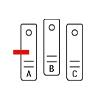

Australia is one of the world’s leading destinations for migrate overseas.
Cosmopolitan to the core, along with a high quality of life and stable economy make Australia one of the best countries to live in.
With a high demand for migrants, Australia has opened its doors to individuals with the right skills and talent to give the country a distinctive edge on the global platform.




it will fetch you a high-paying job. This becomes
more important if you are thinking of moving to
another country on a job.

it will fetch you a high-paying job. This becomes
more important if you are thinking of moving to
another country on a job.

it will fetch you a high-paying job. This becomes
more important if you are thinking of moving to
another country on a job.
PR Visa applications through Y-Axis?
PR Visa applications through Y-Axis?
PR Visa applications through Y-Axis?
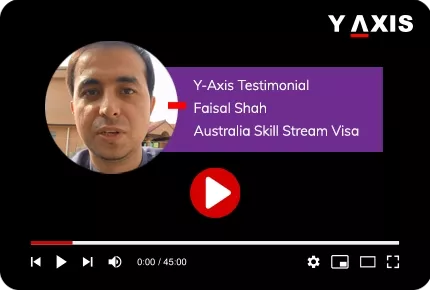
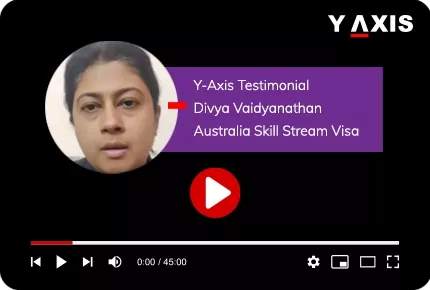
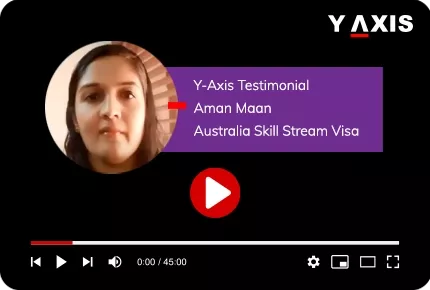
Australia PR Visa – Migrate, Live and Work in Australia
Australia is a leading choice for skilled migrants around the world due to its clear immigration system and excellent living standards. All permanent residents (PR) receive full freedom to reside work and establish their lives in Australia with complete access to public services and benefits.
- The Australian government aims to provide more than 190,000 permanent visas through the 2025–26 Migration Program.
- General Skilled Migration visas receive processing approval for 90% of applications within 8 months.
- Skilled workers in Australia receive an average annual salary of AUD 92,000 or higher,
- The national unemployment rate stays at less than 4.2% during 2024-25.
- Individuals can achieve citizenship after holding Australia PR for 12 months.
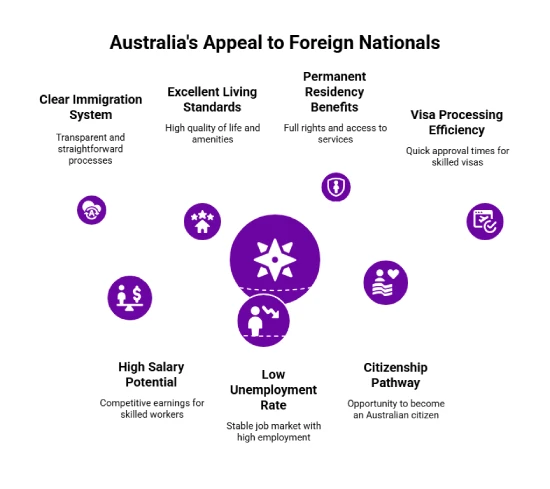
*Looking for guidance with Australia immigration? Y-Axis is here to support you with the process.
How to Migrate to Australia from the UAE?
The UAE residents can access an established Australian immigration system which provides opportunities for skilled workers and their families as well as investors. Individuals who want to establish a permanent residence should consider Australia due to its high employment opportunities and top-tier educational institutions together with government healthcare facilities which create an excellent migration destination.
Skilled international individuals receive permanent residence status through the Australia PR system by demonstrating their age alongside their work experience and education and their English language skills.
United Arab Emirates residents who qualify can move to Australia through skilled migration opportunities that include Subclass 189, 190, and 491 which lead to permanent residency and citizenship.
*Need assistance with Australia immigration? Sign up with Y-Axis for comprehensive support with the process.
Top Benefits of Australia PR for Immigrants
- International individuals have the ability to live, work and study throughout Australia.
- Access to Medicare which is Australia's public healthcare system.
- Children receive free education within public schools.
- After 4 years, you can choose to apply for citizenship.
- Through sponsorship, you can bring eligible family members to Australia.
- The country provides citizens with secure urban areas, pollution-free surroundings and a superior standard of life.
Australia stands as one of the leading countries when it comes to its quality of life and work–life balance and social security benefits.
List of Australia Visas for Immigrants
Australia offers various pathways for permanent residency based on skills, family ties, investment, and business innovation. Detailed information about the Australian visas for immigration is given in the table below.
| Visa Subclass | Brief Description | Eligibility Criteria |
|---|---|---|
| Skilled Independent Visa (Subclass 189) | Points-tested PR visa for skilled workers without employer or state sponsorship. | Under 45 years, occupation on Skilled List, 65+ points, skills assessment, English proficiency. |
| Skilled Nominated Visa (Subclass 190) | PR visa requiring nomination from an Australian state or territory. | Under 45 years, occupation on Skilled List, 65+ points, skills assessment, English proficiency. |
| Skilled Work Regional Visa (Subclass 491) | Provisional visa for skilled workers in regional areas, leading to PR. | Same as 189/190 with a commitment to live/work in regional Australia and state or family nomination. |
| Employer-Sponsored Visa (Subclass 186) | Permanent visa for skilled workers with sponsorship from an approved employer. | Job offer from an approved sponsor, relevant skills, qualifications, and English language ability. |
| Partner Visa | For spouses/partners of Australian citizens or permanent residents. | Genuine relationship with sponsoring partner, health and character clearances. |
| Business Innovation and Investment Visa (Subclass 188) | Provisional visa for investors or entrepreneurs starting or managing a business. | Business/investment background, meet financial thresholds, submit business proposal, and meet health and character checks. |
Australia Permanent Residence
An individual with Australia PR status gains the ability to reside and work in Australia without any time restrictions. Permanent residents receive the following benefits:
- Government-subsidized healthcare (Medicare).
- Study in Australia at affordable fees.
- Social security benefits become available after you reach the required qualification period.
- People who have held PR status for 12 months can apply for citizenship.
- All industries provide permanent residents with unrestricted work permissions.
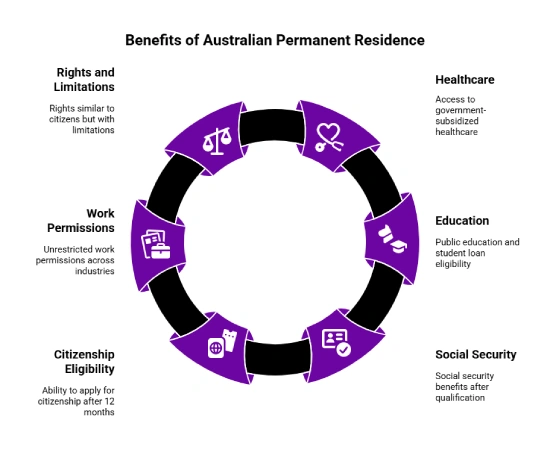
The rights of permanent visa holders align with most of those granted to citizens but they cannot participate in elections or serve in specific public positions.
*Want guidance to apply for Australia PR? Let Y-Axis assist you with the process.
Australia Skilled Migration
The most prominent permanent residency pathway in Australia exists through skilled migration which targets professionals with high market demand. The main subclasses under this program are as follows:
- Subclass 189: Independent PR without state or employer nomination
- Subclass 190: State-nominated PR for skilled workers
- Subclass 491: Regional provisional visa with PR pathway after 3 years
To begin the process applicants must use SkillSelect to submit their Expression of Interest (EOI) and achieve high scores on the points-based system.
How to Find Jobs in Australia from the UAE?
To apply for jobs in Australia, you can follow the steps given below.
Step 1: Search by using Seek and Adzuna and Indeed Australia to find available job openings for your field.
Step 2: Check the occupation lists of different states and territories to locate positions that qualify for Subclass 190 or 491 nomination.
Step 3: Sign up with recruitment companies in Australia that concentrate on connecting skilled migrants to jobs which support permanent residency pathways.
Step 4: Submit job applications to organizations that provide employer sponsorship through Subclass 186 which accelerates permanent residency opportunities.
Step 5: Receive a Job Offer to enhance your point total and increases your chances of state nomination.
Australia Immigration Planning Levels 2025‑26
The details of the Australia Immigration Planning Levels 2025-26 are given below.
| Category | Number of Places |
|---|---|
| Total Places Allocated | 190,000 |
| Skilled Stream | 137,000 |
| Family Stream | 52,500 |
Australia regards healthcare, IT, engineering, and regional development as the most important sectors. Australia aims to attract skilled migrants who work in essential fields such as healthcare, technology and engineering to address labor shortages and drive regional advancement.
Australia uses its yearly migration strategy to maintain economic development while achieving population stability alongside securing skilled human resources. The initiative attracts skilled professionals who enhance economic growth, bridge workforce shortages, and advance sustainable national progress.
Projected Employment Growth in Australia between 2025‑30
The projected employment growth in Australia between 2025-30 is given in the table below.
| Sector | Projected Job Growth (2025–2030) |
|---|---|
| Healthcare and Social Assistance | +250,000 jobs |
| Professional, Scientific & Technical Services | +200,000 jobs |
| Education and Training | +120,000 jobs |
| Construction and Infrastructure | +90,000 jobs |
| Information & Communication Technology (ICT) | +75,000 jobs |
Australia's workforce demand will be effectively met through the participation of skilled migrants who will fill essential roles especially in critical sector shortages. The majority of positions available in areas outside major cities will be filled by people from different regions because there is no sufficient local talent. Migration schemes such as Subclass 491 aim to guide proficient employees toward the regions that require their services the most.
Australia Skills Assessment
Prior to submitting your Permanent Residency (PR) visa application to Australia you have to undergo a skills assessment conducted by an authorized organization which will validate both your educational background and professional background. Your capabilities must conform to the criteria established by Australia for the specific job you have selected.
The details of Australian assessing bodies are given below.
| Assessing Authority | Applicable Occupations |
|---|---|
| ACS | IT professionals |
| Engineers Australia | Engineering roles |
| AHPRA | Healthcare professionals |
| VETASSESS | General professionals, managers, business roles |
| TRA (Trades Recognition Australia) | Trade occupations (plumbers, electricians, etc.) |
A positive skills assessment is required to submit an Expression of Interest (EOI) for Australian visas.
Australia Immigration Pathways
Australia offers several immigration streams, including:
| Immigration Pathway | Visa Subclass/Type | Description |
|---|---|---|
| Points-tested Skilled Migration | Subclass 189, 190, 491 | PR or provisional visas based on age, skills, English proficiency, and points. |
| Employer-nominated PR | Subclass 186 | Permanent visa for skilled workers sponsored by an approved Australian employer. |
| Global Talent Visa | Global Talent Independent (GTI) | For individuals with exceptional achievements in target sectors like tech, science, and academia. |
| Business & Investment Visas | Subclass 188 | Provisional visas for investors or entrepreneurs with business or financial credentials. |
| Family & Partner Visas | Partner, Parent, Child visas | For spouses, children, or relatives of Australian citizens or permanent residents. |
Each pathway has distinct eligibility requirements and benefits. Skilled migration is one of the most popular among international individuals.
Eligibility for Australian Immigration
To be eligible for Australian migration, you must:
- Be below 45 years of age
- Have an occupation on the Skilled Occupation List (SOL)
- Have a score of at least 65 points
- Obtain a positive skills assessment
- Prove having competent level of English proficiency
- Meet health and character requirements
Requirements for Australian Immigration
The key requirements include:
- Valid passport
- Positive skills assessment
- English language test results
- Education and work experience documents
- EOI submission through SkillSelect
- State nomination (for Subclass 190 or 491)
- Health & police clearance
How to get an Australian PR from the UAE?
The procedure to apply for Australia PR from the UAE is given below.
Step 1: Check eligibility requirements before selecting the most appropriate visa option.
Step 2: Get your skills assessed. You need to send your qualifications and work experience for Australian standard verification to either ACS or Engineers Australia or AHPRA.
Step 3: Demonstrate your English language proficiency, through standardized tests like IELTS, PTE or TOEFL.
Step 4: Create an EOI through SkillSelect. Your point score determines your ranking on the list and higher points help you secure an Invitation to Apply (ITA).
Step 5: Submit your visa application and then you have to wait for the visa to be granted. After receiving your invitation you need to send your visa application along with all necessary documents and health assessments and police background checks. After your application gets approved you will obtain your Permanent Residency (PR) visa.
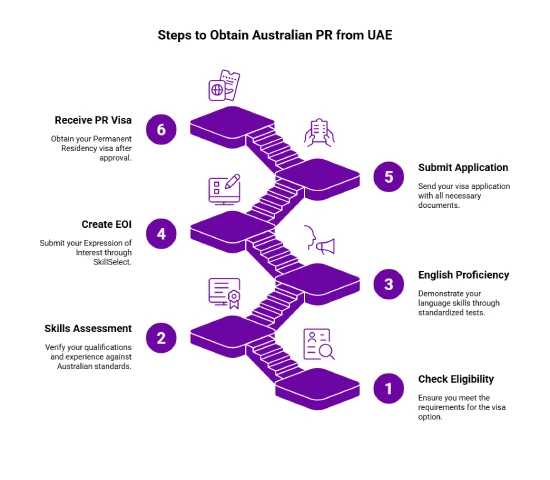
Y-Axis can assist you with each of these steps from the UAE.
Australia visa processing time
The processing time for the Australian visas depends on the type of visa you have applied for and document completeness. Details of the processing time of various Australian visa are given below.
| Visa Type | 75% of Applications Processed In |
|---|---|
| Subclass 189 | 4 to 8 months |
| Subclass 190 | 6 to 9 months |
| Subclass 491 | 7 to 12 months |
Incomplete documentation, high volume of application, or verification need may affect the processing time for Australian visa applications.
Australia Visa Fees
Details of the fees for Australian Visas are given below.
| Visa Subclass | Primary Applicant Fee | Spouse/Partner | Each Child |
|---|---|---|---|
| Subclass 189 | AUD 4,640 | AUD 2,320 | AUD 1,160 |
| Subclass 190 | AUD 4,640 | AUD 2,320 | AUD 1,160 |
| Subclass 491 | AUD 4,640 | AUD 2,320 | AUD 1,160 |
Note: Additional costs can incur for English tests, skills assessment, police clearance, medical exams, and biometrics.
How Y‑Axis Can Help You?
Y-Axis stands as the UAE's reliable immigration service provider. We provide:
- Free profile evaluation with Australia Immigration Points Calculator.
- English language training for IELTS and PTE exams
- Professional skills evaluation and Expression of Interest submission
- Visa application documentation and filing
Y-Axis brings over 25 years of expertise to guide clients through a successful migration process to Australia.
{
"@context": "https://schema.org/",
"@type": "BreadcrumbList",
"itemListElement": [{
"@type": "ListItem",
"position": 1,
"name": "Home",
"item": "https://www.y-axis.ae/"
},{
"@type": "ListItem",
"position": 2,
"name": "Migrate",
"item": "https://www.y-axis.ae/migrate/"
},{
"@type": "ListItem",
"position": 3,
"name": "Australia Immigration",
"item": "https://www.y-axis.ae/migrate/australia/"
}]
},
{
"@context": "https://schema.org",
"@type": "FAQPage",
"mainEntity": [{
"@type": "Question",
"name": "What is Australia immigration?",
"acceptedAnswer": {
"@type": "Answer",
"text": "Individuals moving to Australia can do so through either temporary or permanent residency by following the country's immigration procedures. The Australian government offers different pathways for people to obtain permanent residency including skilled migration along with family sponsorship and employer nomination and investment programs. Skilled migration represents the standard permanent residency track through subclasses 189 190 and 491 which require applicants to reach specific points through an assessment system. Applicants need to qualify for the program and complete skills evaluation and demonstrate English language abilities. People who are approved for the program achieve the privilege of living and working in Australia while using public services."
}
},{
"@type": "Question",
"name": "Why choose Australia for immigration?",
"acceptedAnswer": {
"@type": "Answer",
"text": "Australia stands as the preferred migration destination because of its first-rate living standards together with a robust economic structure and clear immigration process. Professionals with advanced abilities enjoy competitive pay and professional development alongside free medical services and educational access. The nation maintains its reputation as one of the safest and most desirable places to live in the world. The structured process leading to permanent residency as well as citizenship makes it the perfect destination for establishing permanent residence. Australia presents various social welfare programs while fostering diverse communities and operates immigration programs which recruit skilled individuals from healthcare, IT, engineering and trade sectors."
}
},{
"@type": "Question",
"name": "How to apply for Australia immigration?",
"acceptedAnswer": {
"@type": "Answer",
"text": "The steps to apply for Australia immigration is given below.
Step 1: Check Your Eligibility. Your first step requires verifying that your job appears on Australia’s Skilled Occupation List (SOL) and you can fulfill requirements including being under 45 years old, demonstrating English language skills, and obtaining at least 65 points on the immigration points test.
Step 2: Get a Skills Assessment The next step involves submitting your qualifications and work experience to the relevant assessing authority.
Step 3: Take an English Language Test. You must pass either IELTS, PTE, or TOEFL to reach the mandatory standard (which is IELTS 6.0 in all bands for competent English).
Step 4: Submit an Expression of Interest (EOI) To initiate visa application you should use SkillSelect to create a profile then submit your EOI for visa subclasses 189, 190 or 491 depending on your points and occupation.
Step 5: Apply for the Visa After Invitation After receiving an Invitation to Apply (ITA) you must complete your visa application by providing required documents and obtaining police clearance and health checks."
}
},{
"@type": "Question",
"name": "How much does immigration to Australia cost?",
"acceptedAnswer": {
"@type": "Answer",
"text": "Detailed information about the cost of Australian immigration is given in the table below.
Applicant Category
Cost (AUD)
Primary Applicant
AUD 4,640
Spouse/Partner
AUD 2,320
Each Dependent Child
AUD 1,160
The estimated expenses for additional requirements include the following:
Both IELTS and PTE English test requirements need to be fulfilled.
A skills assessment is necessary to demonstrate your qualifications.
Applicants must provide police clearance documentation.
Medical tests are necessary for all applicants.
Biometric fees must be paid by every applicant.
The estimated cost for a family of three members adds up to approximately AUD 8,000 to AUS 12,000."
}
},{
"@type": "Question",
"name": "How long does immigration to Australia take?",
"acceptedAnswer": {
"@type": "Answer",
"text": "The processing times of Australian visas are given below.
Visa Subclass
Average Processing Time
Subclass 189
4–8 months
Subclass 190
6–9 months
Subclass 491
7–12 months"
}
},{
"@type": "Question",
"name": "Which IELTS test is required for Australia immigration?",
"acceptedAnswer": {
"@type": "Answer",
"text": "Australian skilled visa applicants generally must demonstrate their proficiency by completing the IELTS General Training examination. The typical required test scores for different language proficiency levels follow this pattern:
Competent English: 6.0 in every band which includes Listening Reading Writing and Speaking
Some job categories together with state nominee programs need scores that exceed the minimum standard. Healthcare professionals can submit the Occupational English Test (OET) as an alternative to PTE Academic and TOEFL iBT. The test must be administered by an official testing organization and remain valid during the visa application period."
}
},{
"@type": "Question",
"name": "Can I immigrate to Australia with a job offer?",
"acceptedAnswer": {
"@type": "Answer",
"text": "Yes, you can immigrate to Australia without a job offer. However, a job offer from an Australian employer who is approved by the government can simplify your immigration process. The existence of an approved job offer enables you to obtain an Employer Nomination Scheme (Subclass 186) or increase your Subclass 190/491 points when the position belongs to a state's job demand list. A valid job offer enhances your visa invitation prospects when you apply for IT, engineering, healthcare, and trades occupations that are in high demand. Through employer sponsorship, you can eliminate specific criteria including high point thresholds and regional residence requirements."
}
},{
"@type": "Question",
"name": "Is Australia immigration open for skilled workers?",
"acceptedAnswer": {
"@type": "Answer",
"text": "Yes, Australia immigration for international skilled workers. International skilled workers can pursue immigration to Australia through the Skilled Migration Program. It welcomes skilled workers to apply for permanent residency. Professionals who meet the eligibility criteria specified in the Skilled Occupation List can apply for Subclass 189 (Independent PR), Subclass 190 (State-nominated PR) and Subclass 491 (Regional Provisional) visas. The assessment process considers applicant age along with their work experience and qualifications and English language skills and additional factors. The state and regional areas of Australia need skilled workers who work in IT, construction, engineering, healthcare, and education sectors."
}
},{
"@type": "Question",
"name": "How can nurses immigrate to Australia?",
"acceptedAnswer": {
"@type": "Answer",
"text": "The profession of nursing experiences substantial workforce shortages in Australia which leads to many opportunities for candidates to enter through visa subclasses 189, 190 and 491 based on the Skilled Occupation List.
The Australian Health Practitioner Regulation Agency (AHPRA) evaluates their skills after which they need to show their English proficiency through the International English Language Testing System (IELTS) test with band scores of 7.0 in each section. Following approval, they can submit an Expression of Interest (EOI) through SkillSelect and initiate state nomination procedures when necessary. Nurses who have received job offers from Australian hospitals or aged care centers often choose the Employer Nomination Scheme (ENS) Subclass 186 visa pathway."
}
},{
"@type": "Question",
"name": "Can I immigrate to Australia with my family?",
"acceptedAnswer": {
"@type": "Answer",
"text": "Yes, you can immigrate to Australia with family. Applying for permanent residency through the Australian immigration system lets you add your dependent family members. You can include your partner and children who are either younger than 18 years old or older adults who depend on you.
Every family member who obtains a visa will enjoy the equivalent privileges including the ability to reside and work and study in Australia. Through the Family Reunion Program you gain the possibility to sponsor your parents after receiving permanent residency. The application process requires proof of your financial ability to care for dependents along with satisfying all health and character standards."
}
}]
}
]